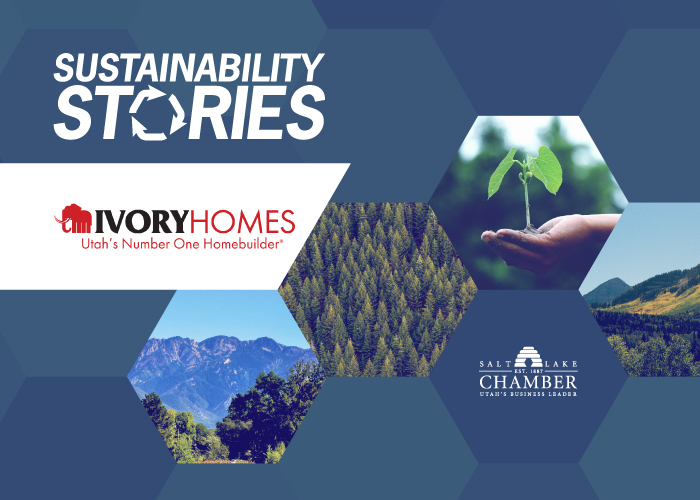In the modern economy, environmental sustainability is one factor in how businesses can stand out and thrive. Each month, the Salt Lake Chamber will highlight a Utah business making positive strides for the environment and our natural resources to encourage support and innovation.
Our feature, Ivory Homes, has been building communities across Utah for over 34 years and is now leading the way in sustainable homebuilding. Their commitment to thoughtful development shows in everything from energy-efficient design and water-wise landscaping to educating employees and homeowners on conservation practices. We met with CEO Clark Ivory to learn more about their sustainability efforts.
When did Ivory Homes start focusing on sustainability?
Over the past decade, Ivory Homes has prioritized sustainability. Early on, we made simple yet important improvements, such as adding six-inch walls to allow for increased insulation and upgrading to high-performance vinyl windows with a U-Value of 0.29, which is significantly higher than most builders.
In 2018, we took a bigger step by launching the “30,000 Tree Initiative” to improve air quality and invest in our communities. So far, we’ve planted over 17,000 trees. In 2020, we began offering water-wise landscaping options to help conserve Utah’s precious water resources.
Many small improvements have led to Ivory’s Home Energy Rating System (HERS) score averaging 53 (the lower the better, similar to a golf score), making Ivory more energy-efficient than most builders with a HERS score in the 70s. Ivory is also focused on making homes healthier with low-VOC paint and advanced air filtration.
How do you encourage sustainability amongst your employees and customers?
Every Ivory Homes employee understands that, as Utah’s Number One Homebuilder™, we have a responsibility to lead by example in sustainability. In addition to dozens of tree plantings, our team is continually developing new ideas to make our homes more sustainable.
We also believe affordability equals sustainability. That’s why our nonprofit, Ivory Innovations, is currently working on seven affordable housing projects across Utah, focusing on innovative, lasting solutions. We are also bringing national sustainability experts to the state to help guide innovation and best practices.
What water conservation features are standard in your homes, and how do they contribute to overall sustainability?
At Ivory Homes, water conservation is built into every home. We use EPA WaterSense-certified fixtures, including 1.5 GPM faucets, showerheads with flow rates under 2.0 GPM and high-efficiency 1.28 GPF toilets. Our 96% efficient gas tankless water heaters provide hot water on demand so that homeowners can enjoy longer, warmer showers without wasting energy or water.
Outside, our water-wise landscaping designs use less than one-third of the water that traditional landscapes require, helping to reduce outdoor water use while maintaining beautiful yards. From 2020 through the end of 2024, these efforts have saved approximately 550 million gallons of water, with projected savings reaching nearly 795 million gallons by year’s end. These thoughtful choices not only lower utility bills but also support long-term sustainability in Utah’s dry climate.
What small steps can businesses take to be more sustainable?
One of the most powerful steps any business can take toward sustainability is education. By regularly sharing knowledge with employees, partners and customers — whether it’s about energy-efficient living, water conservation or clean air practices — we help create a culture where sustainability is second nature. Hosting workshops, sharing simple tips and leading by example in our own operations empowers others to make smarter, more sustainable choices.
Do you have a favorite simple strategy to be sustainable in your own life?
Sustainability begins with balance, which can be difficult to achieve but is always worthwhile. Balance comes when we prioritize spirituality, physical health, ongoing education and meaningful time with family and friends. If we live a balanced life, we will be more consistent and resilient, enabling us to have the sustainable energy required to overcome life’s challenges.
To read other sustainability stories, click here.


